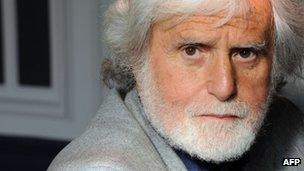Syria unrest: Surgeon tells of Homs makeshift hospital
- Published

Jacques Beres is a 71-year-old surgeon, and co-founder and former member of the Medecins Sans Frontieres group. He has returned last week from the besieged Syrian city of Homs where, in a makeshift clinic, he managed to treat dozens of people wounded during weeks of bombardment. He told the BBC News website what he saw.
"I spent 12 days in Homs, arriving via Lebanon. We planned the trip for several weeks. It was very dangerous to enter illegally so I made the journey with the help of a chain of intermediaries.
"One met me at the airport in Beirut. I landed in the evening and by 09:00 the next morning I was already in Syria. I had a rest at a farm and then progressed to Qusayr [three miles (4.8km) south-west of Homs], where I worked for a few days before making the journey into Homs.
"I was scared. It is only reasonable to have some fear. Bombs are never normal. I can't really compare Homs to any other war zone I have worked in though - apart, perhaps, from Chechnya.
"Grozny is small and the town has a mixture of rural and urban areas. The houses in Homs are built in a similar way - there is no protection and, when they are hit, they collapse completely. Also, the ferocity of the attack and the repression are comparable.
"I was based in a makeshift operating theatre. Everyone is too scared to go to the state-run hospital - they are terrified of having a limb amputated, or of being kidnapped. Only the Syrian army soldiers go there now.
"It was just one operating theatre, in someone's home. It was badly lit, the electricity was frequently cut. It was minimal, very basic. Marie Colvin came to visit us three days before she died.
"We did have running water but, as it was a private hospital, there was only water in some rooms - the bathroom and kitchen. There were no proper sterilisation facilities either - we just had to rinse our hands with alcohol and put them straight into our gloves.
"There was a Syrian team and a Syrian doctor who ran the hospital, who slept there and treated patients and kept everyone's morale up. There were other surgeons who came and helped when they could.
"I operated on 90 people. We couldn't help those who had been injured in the chest and the head, only those with wounds to the abdomen and below.
"The people there are convinced that they will win. They are very brave but they are also desperate at having been bombarded for so long. They think they have been abandoned.
"They are always watching television. The TV is always on, the news flows and they communicate via Facebook and Twitter. They know what is going on.
"I travelled there because it had to be done. It's an emergency. It helps them a lot to see someone from abroad helping them. Plus, I'm very experienced in this field. You can gain a lot yourself from such an experience too - these people are immensely brave. They just want their freedom, they want to get rid of the tyrant. I'd like to return if I can."